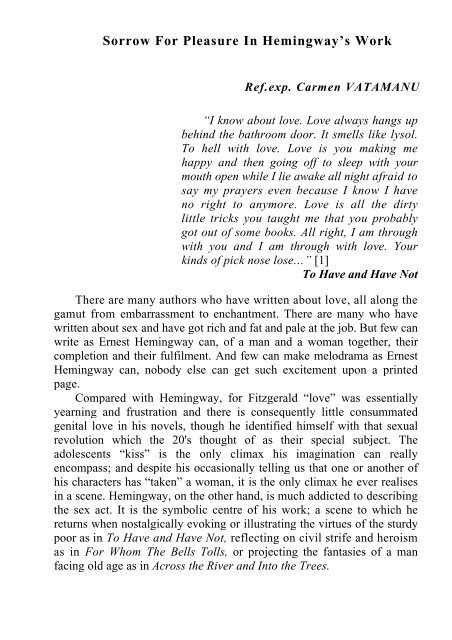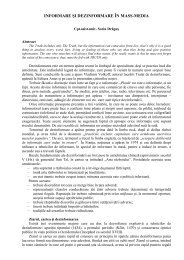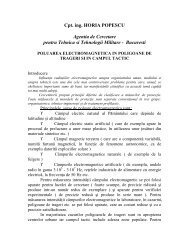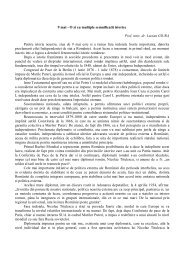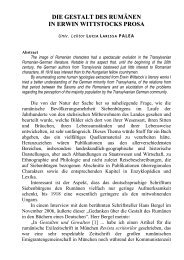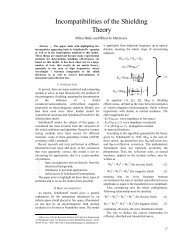Sorrow For Pleasure In Hemingway's Work
Sorrow For Pleasure In Hemingway's Work
Sorrow For Pleasure In Hemingway's Work
Create successful ePaper yourself
Turn your PDF publications into a flip-book with our unique Google optimized e-Paper software.
<strong>Sorrow</strong> <strong>For</strong> <strong>Pleasure</strong> <strong>In</strong> Hemingway’s <strong>Work</strong><br />
Ref.exp. Carmen VATAMANU<br />
“I know about love. Love always hangs up<br />
behind the bathroom door. It smells like lysol.<br />
To hell with love. Love is you making me<br />
happy and then going off to sleep with your<br />
mouth open while I lie awake all night afraid to<br />
say my prayers even because I know I have<br />
no right to anymore. Love is all the dirty<br />
little tricks you taught me that you probably<br />
got out of some books. All right, I am through<br />
with you and I am through with love. Your<br />
kinds of pick nose lose…” [1]<br />
To Have and Have Not<br />
There are many authors who have written about love, all along the<br />
gamut from embarrassment to enchantment. There are many who have<br />
written about sex and have got rich and fat and pale at the job. But few can<br />
write as Ernest Hemingway can, of a man and a woman together, their<br />
completion and their fulfilment. And few can make melodrama as Ernest<br />
Hemingway can, nobody else can get such excitement upon a printed<br />
page.<br />
Compared with Hemingway, for Fitzgerald “love” was essentially<br />
yearning and frustration and there is consequently little consummated<br />
genital love in his novels, though he identified himself with that sexual<br />
revolution which the 20's thought of as their special subject. The<br />
adolescents “kiss” is the only climax his imagination can really<br />
encompass; and despite his occasionally telling us that one or another of<br />
his characters has “taken” a woman, it is the only climax he ever realises<br />
in a scene. Hemingway, on the other hand, is much addicted to describing<br />
the sex act. It is the symbolic centre of his work; a scene to which he<br />
returns when nostalgically evoking or illustrating the virtues of the sturdy<br />
poor as in To Have and Have Not, reflecting on civil strife and heroism<br />
as in <strong>For</strong> Whom The Bells Tolls, or projecting the fantasies of a man<br />
facing old age as in Across the River and <strong>In</strong>to the Trees.
<strong>In</strong> his earlier fictions, Hemingway’s descriptions of the sexual<br />
encounter are intentionally brutal, his later ones unintentionally comic;<br />
for in no case, “can he quite succeed in making his females human, and<br />
coitus performed with an animal, a thing or a met dream is either<br />
horrible or ridiculous” [2]. If in <strong>For</strong> whom the Bell Tolls Hemingway has<br />
written the most absurd love scene in the history of the American novel,<br />
this is not because he lost momentarily his skill and authority “it is a<br />
give-away-a moment which illuminates the whole erotic content of his<br />
fiction” [3]. Hemingway is only really comfortable in dealing with<br />
“men without women”. The relation of father to son of battle –<br />
companions, fellow inmates in a hospital a boy and a gangster; these<br />
move him to simplicity and truth. Perhaps his best of all with men who<br />
stand alone – in night time scenes when the solitary individual sweats in his<br />
bed on the verge of night more, or arises to confront himself in the glass;<br />
“though he is at home, too, with the Pip Van Winkle archetype, with men in<br />
flight from women” [4].<br />
Certainly, he returns again and again to the journey to the war - this<br />
traditional evasion of domesticity and civil life. Yet he feels an obligation<br />
to introduce women into his more ambitious fictions, though he does not<br />
know what to do with them beyond taking them to bed. All his life, he<br />
has been haunted by scene of how simple it all was once, when he could<br />
take his <strong>In</strong>dian girl into the clean - smelling woods, stretch out beside her<br />
on the pine - needless and have no obligations at all.<br />
<strong>In</strong> Hemingway the rejection of the sentimental happy ending of<br />
marriage involves the acceptance of the sentimental happy beginning of<br />
innocent and inconsequential sex, and “camouflages the rejection of<br />
maturity and of fatherhood itself” [5]. This is at its worst in his fiction<br />
that drives the tender - hearted husband of “<strong>In</strong>dian Camp” to suicide, or<br />
which takes Catherine away from Lieutenant Henry in A Farewell to<br />
Arms.<br />
Poor things, all they wanted was innocent love and only love on an<br />
island of peace in a world at war, love - making without end in a scarcely<br />
real country in which neither owed life nor allegiance was possible. But<br />
such a relationship can, of course, never last, as Hemingway - Nick<br />
Adams - Lieutenant Henry has always known: “They all ended the same.<br />
Long time ago, good. Now, no good” [6].<br />
Only the dead woman becomes neither a bore nor a mother; and<br />
before Catherine can quite become either she must die, killed not by<br />
Hemingway, of course but by childbirth. It is all quite sad and lovely at<br />
the end: the last kiss bestowed on what was a woman and now is a statue,<br />
the walk home through the rain. Poe himself could not have done better,
though he was haunted not by the memory of a plump little <strong>In</strong>dian on the<br />
hemlock but a fantasy of a high - born maiden “loved with a love that<br />
was more than love” and carried away by death.<br />
“The dark Lady who is neither wife not mother, blends with the<br />
image of Fayaway, the exotic servant, consort reconstructed by Mellville<br />
in Typee, out of memories of an eight-year-Polynesian girl-child” [7]. <strong>In</strong><br />
Hemingway, such women are mindless, soft, subservient, painless<br />
decisive for extracting seed without human engagement. The Fair Lady,<br />
on the other hand, who gets pregnant and wants a wedding or uses her<br />
sexual allure to assert her power, is seen as a threat and a destroyer of<br />
men. But the females are <strong>In</strong>dians or Latins, black-eyed and dusky in hue,<br />
or at least Anglo-Saxon, if not symbolically blond. Neither are permitted<br />
to the virgins indeed, both are imagined as having been often possessed,<br />
though in the case of the Fair Women promiscuity is used as a device for<br />
humiliating and unmanning the male foolish enough to have entered into<br />
a marriage with her.<br />
Through the Dark anti-virgin, on the other hand a new lover enters<br />
into a blameless communion with the other uncommented males who<br />
have possessed her and departed, as well as with those yet to come. It is a<br />
kind of homosexuality once-removed, the appeal of the whorehouse<br />
(Eden of the world of men without women) embodies in a single figure.<br />
“When <strong>Hemingway's</strong> bitches are Americans, they are hopeless and<br />
unmitigated bitches; the British bitch is for Hemingway only a demibitch,<br />
however, as the English are only, as it were, demy-Americans” [8].<br />
Catherine is delivered from her doom by death; Brett Ashley in The Sun<br />
Also Rises is permitted, once at least, the gesture of her mythical role.<br />
But it is quite a feat at that, and Brett cannot have off congratulating<br />
herself: “You know it makes one feel rather good deciding not to be a<br />
bitch” [9]. Yet Brett never becomes a woman really; she is mythicized<br />
rather than redeemed. And if she is the most satisfactory female character<br />
in all of Hemingway, this is because for once she is presented not as an<br />
animal or as a nightmare, but quite audaciously as a goddess, the<br />
bitchgodess with a boyish bob (Hemingway is rather fond of women who<br />
seem as much boy as girl); no man embraces her without being in some<br />
sense “castrated” except for Jake Barnes who is unmanned to being with;<br />
no man approaches her without wanting to be castrated, except for<br />
Romero, who thinks naively that she is-or can easily become-a woman.<br />
<strong>In</strong>deed, when Brett leaves that nineteen-year-old bullfighter, one suspects<br />
that, though she arrows, it is because she will not be “one of those<br />
bitches who ruins children”, she is really running away because she<br />
thinks he might make her a woman. Certainly Romero's insistence that
she let her hair grow out has something to do with it. “He wanted me to<br />
grow my hair out. Me, with long hair, I'd look so like hell... He said it<br />
would make me more womanly. I'd look a fright” [10].<br />
To yield up her cropped head would be to yield up her emancipation<br />
from female servitude to become feminine rather than phallic; and this<br />
Brett cannot do. She thinks of herself as a flapper though the word<br />
perhaps would not have occurred to her, as a member of the “Lost<br />
Generation”; but the Spaniards know her, immediately as a terrible<br />
goddess the avatar of an ancient archetype. She tries in vain to enter into<br />
the circle of Christian communion, but is always turned aside at the door;<br />
she changes her mind, she has forgotten her hat - the apparent reason<br />
never matters; She belongs to a world alien and prior to that of the<br />
Christian churches in which Jake finds a kind of peace. <strong>In</strong>capable of<br />
love, except as a moment in bed, Brett can bestow on her worshipers<br />
nothing more than the brief joy of a drunken ecstasy-followed by<br />
suffering and deprivation and regret. <strong>In</strong> the end, not only are the physical<br />
lovers unmanned and degraded, but even Jake, who is her priest and is<br />
protected by his terrible wound, is humiliated. <strong>For</strong> her service is a<br />
betrayal not only of his Catholic faith but of his pure passion for<br />
bullfighting and trout-fishing; and the priest of the “bitch-goddess” is on<br />
the purely human level, a pimp.<br />
Brett does not have some respect for Barnes, even a little tenderness,<br />
though her actions scarcely show abiding love. At best she can affirm his<br />
worth and share his standards and perception. When in public, she knows<br />
how to keep her essential misery to herself; when alone with Barnes she<br />
will express her feelings admit her faults, and even display good<br />
judgement. Thus her friend Count Mippiopolous is introduced to Barnes<br />
as “one of us”. The count qualifies by virtue of his war wounds, his<br />
invariable calmness and his curious system values. He appreciates good<br />
food, good wine, and a quiet place in which to enjoy them. Love also has<br />
a place in his system, but since he's “always in love”, the place seems<br />
rather shaky. Like Jake and Brett and perhaps Georgette, he simply bears<br />
himself well among the post-war ruins.<br />
Loving someone means wishing to do certain things for that person.<br />
We wish to sacrifice ourselves; we wish to serve it, whatever it takes; if<br />
all these things are not there, then it means that we don't really and truly<br />
love. It will take some time till all these things happen but once they did,<br />
we will be happy, we know we will. The same happens to Frederic; in his<br />
relationship to Catherine he is the taker, because in a relationship, there<br />
is always one who gives more than he takes or takes more than he gives.<br />
<strong>In</strong> no way can Frederic's desertion at the river or his escape into
Switzerland be seen as a sacrifice for Catherine. It is Catherine who<br />
makes the sacrifices, and who wishes to serve. It is Catherine who makes<br />
a religion of love. As Frederic admits, he is always able to forget those<br />
things which the priest knew – meaning that his relationship to Catherine<br />
is reduced only to “passion and lust”. Going back to <strong>For</strong> Whom the Bell<br />
Tolls, we can mention that: Within each step that she makes, we see more<br />
clearly that Pillar had led a hard life and is as tough as an old eagle. Yet<br />
the heart still beats for humankind even when the head coldly admits the<br />
need for violent activity against the enemy. Pillar’s sentiments-but<br />
Catherine's also - find many echoes among the more sympathetic<br />
characters of the novel, still Maria is the one closest to Catherine's<br />
feelings-and views of life.<br />
One of the familiar Hemingway themes in <strong>For</strong> Whom the Bell Tolls<br />
is the idea that a “same consciousness of death will give added depth and<br />
meaning to the events of life” [11]. Jordan - for example shows a kind of<br />
spiritual relationship to Pillar, in that he can be, by turns, both tender and<br />
tough minded. He can love human beings and allow himself to become<br />
involved with them, as in his love for Maria. The other entire extreme he<br />
must be the cold minded and detached commander, reserving part of<br />
himself in all human relationship so that the necessary job can be done.<br />
He cannot often expand warmly; as soldier, he must contract coldly with<br />
himself.<br />
“‘I cannot have a woman doing what I do’, he tells Maria”! But thou art<br />
my woman now”’ [12]. After one of their encounters, Maria observes that<br />
he is now thinking of something else than love. On another occasion,<br />
talking to Pillar the “men-without woman” idea emerges very clearl “you<br />
are a very cold boy...<strong>In</strong> the head you are very cold” [13]. It is not a<br />
liking for hard masculine comradeship which motivates the Hemingway<br />
hero, but a preoccupation with the work a man must do where women<br />
have no place and may even be in the way. The morning Jordan kills the<br />
fascists cavalryman, Maria is still beside him and behind him, dressing<br />
herself under the robe. “She had no place in his life now” [14].<br />
The significance of Maria when she is seen in the light of such other<br />
heroines as Catherine Barkley, Maria Morgan and even Dorothy Bridges,<br />
is finally symbolic. <strong>In</strong> the lonely alien region of Guadarramas, she comes<br />
to stand as the image of “home”. Most of Hemingway’s women tend to<br />
take on this special symbolic meaning. Dorothy Bridges (a fairly<br />
unsympathetic portrait) is explicitly equated with nostalgia a somewhat<br />
untrustworthy reminder of the comforts and the joys which are so rarely<br />
possible in a world besieged by the ideology of terror. Catherine Barkley<br />
and Maria Morgan, though in different ways, represent a normal
domesticity vanquished by war and by the economic struggle for<br />
survival. Similarly, Maria stands for the normal in the midst of a terrible<br />
abnormality. She has been subjected to all sorts of outrages by her fascist<br />
captures. The rape is an act of supreme brutality; only the true tenderness<br />
of Jordan, as Pillar well, knows can erase the psychological scars the<br />
fascist have left. The cutting of Maria’s hair is a symbol of her loss of<br />
normal womanhood or girlhood, just as its growing-out indicates her<br />
gradual return to balance and health.<br />
One might argue, of course that the normal male-female situation in<br />
Hemingway is something like “what took place in the Garden of Eden,<br />
just after the eating of the fruit of the tree but before the malediction”<br />
[15]. All these Eves are as pleasurably ductile as the Adams are hirsute<br />
and sexually vigorous. Like all travesties, such a characterization would<br />
have its element of truth. But it would tend to ignore the real tenderness<br />
with which the “good women” in Hemingway are treated. The fate of the<br />
heroines is that they are almost never at home; their virtue is that the best<br />
of them carry the home-image with them wherever they go.<br />
The episodes concerning the affair with Maria from the novel <strong>For</strong><br />
Whom the Bells Tolls have been condemned as extraneous, but looking<br />
specifically at the theme of the earth and the machine, one notes that<br />
Maria, Roberto's beloved “rabbit” is somehow identified with the Spain<br />
earth that was then violated figuratively as Maria was violated literally.<br />
Maria’s shaved head is so realistic a detail that one is surprised to see an<br />
obvious symbolism as well. The least one can say is that “the story of<br />
Maria, taken prisoner, raped, rescued from a troop train, and tanks of<br />
the enemy, parallels certain aspects of Spanish history from 1936 to<br />
1939” [16].<br />
Paired with Maria, Pillar, a kind of Iberian Earth-mother, who is<br />
proud that the world itself moved during her love-making, who had lived<br />
nine years with three of the worst-paid matadors in the world, still<br />
reminds us again and again of the love making and bull-fighting that<br />
represent Spain, as it should have been. There is something pretty suspect<br />
in the love story of the novel From Whom the Bell Tolls, which has so<br />
stirred and charmed the reviewers. By now the relation between men and<br />
women in <strong>Hemingway's</strong> novels has fixed itself into a rather dull<br />
convention according to which the men are all dominance and<br />
knowledge, the women all essential innocence and responsive passion.<br />
These relationships reach their full development almost at the moment of<br />
the first meeting and are somehow completed as soon as begun. Most<br />
significantly one feels of love in the Hemingway novels that it can exist,<br />
at all, only because circumstances so surely doom it. We do not have to
“venture very deep into unexpressed meanings to find a connection<br />
between <strong>Hemingway's</strong> social myth and the pattern of his love stories”<br />
[17] - in both, there is a desperation which makes a quick grab for simple<br />
perfection. This desperation makes understandable the compulsive<br />
turning to courage as the saving and solving virtue. The whole complex<br />
of attitudes is, we might say, a way of responding to the imminent idea of<br />
death.<br />
Most of Hemingway’s characters especially female characters from<br />
the novel The Sun Also Rises are in continuous search for more, for<br />
better, though they are all abandoned people, abandoned by the<br />
reasonability of time and left to struggle as they may with the disastrous<br />
prospects of living. Brett, Lady Ashley speaks about by her passions, or<br />
Jake Barnes, unsexed by the war, or Cohn, who crumbles to pieces<br />
beneath the weight of his desire for Brett, are also abandoned people.<br />
Brett, the heroine, might have stepped out of The Green Hat; she is the<br />
sentimentally regarded dare-evil, and she never becomes real. Lady Brett<br />
Ashley moves in a set of Montparnasse Americans, drinks, sleeps with<br />
men and is bored. ‘She is engaged to a ruined Englishman and is loved<br />
by the American newspaper man who tells the story’ [18]. She goes to<br />
San Sebastian with a Jewish boxer and leaves him for a young matador.<br />
They do not talk about their souls, - as we saw it was the case with Maria<br />
or Catherine - they do not unravel their feelings, they are not in love,<br />
they do not suffer, they do not get hurt or even die - as Catherine - for a<br />
well defined cause: love and passion; they do not know those words; no,<br />
they merely order drinks and dinners, swear, have a good time; they do<br />
not have meaning in their life, they are as we said before abandoned and<br />
left to struggle as they may with disastrous prospects of living.<br />
Hemingway is a novelist of the expatriated. The Sun Also Rises<br />
showed us a group of Americans and one Englishwoman being violently<br />
idle, first in Paris and then in Spain. They went to bull-fights, they made<br />
love, and they drank. Above all, they drank. They well not congenital<br />
company even in a book, but they knew how to get the utmost out of<br />
their emotions, and of their emotions, and though bored and desperate,<br />
they were seldom dull. The same characters or others like them reappear<br />
in A Farewell to Arms. There is an English woman serving as a nurse in<br />
the Italian army for no better reason than that she speaks the language.<br />
This particular unmarried couple - Catherine and Frederic - rejoicing in<br />
their sin, present a brood target to the censorious, and even to a less<br />
jaundiced view, there is something wanton and wasteful in their<br />
happiness. But if it is an offence to be happy, they certainly pay for it, a<br />
thousand fold; the concluding scenes are unbearably painful, and would
wring tears from a stone. The hypercritical may question whether Henry<br />
would have been granted such freedom of access to Catherine’s<br />
accouchement; but he was headstrong and hard to cross and had no<br />
respect for circumstances:“If people bring so much courage to this<br />
world, the world has to kill them to break them, so of course it kills them.<br />
The world breaks everyone and afterwards many are strong at the<br />
broken places. But those that will not break, it kills. It kills the very good<br />
and the very gentle and the very brave impartially. If you are none of<br />
these, you can be sure it will kill you too, but there will be no special<br />
hurry” [19].<br />
Closing the book, the reader will agree that the narrator had every<br />
reason for espousing this gloomy view and we think there is no better<br />
commentary than the text itself. Sooner or later almost every single<br />
character draws the conclusion - not before having faced some of the<br />
bitterest experiences - that we have to pay the highest price for loving or<br />
being loved; this is what happens, if we must love ...<br />
Notes and references<br />
1. Hemingway, Ernest, To Have and Have Not, New York, Viking<br />
Press, 1977, p. 88.<br />
2. Fielder, Leslie A., Love and Death in the American Novel, New<br />
York, Stein & Day Publishers, 1966, p. 316.<br />
3. Ibidem, p. 317.<br />
4. Ibidem, p. 318.<br />
5. Ibidem, p. 317.<br />
6. Hemingway, Ernest, <strong>In</strong> Our Times, New York, Athenaeum, 1965,<br />
p. 141.<br />
7. Fielder, Leslie A., cited edition, p. 319.<br />
8. Ibidem, p. 320.<br />
9. Hemingway, Ernest, The Sun Also Rises, London, Hunt Bernard<br />
Princenton Ltd, 1983, p. 111.<br />
10. Ibidem, p. 118.<br />
11. Trilling, Lionel, An American in Spain, London, Routledge &<br />
Kegan Paul, 1982, p. 82.<br />
12. Hemingway, Ernest, <strong>For</strong> Whom the Bell Tolls, New York,<br />
Vintage Books, 1979, p. 110.<br />
13. Ibidem, p. 111.<br />
14. Ibidem, p. 115.<br />
15. Trilling, Lionel, c.e., p. 52.<br />
16. Ibidem, p. 60.
17. Ibidem, p. 62.<br />
18. Meyers, Jeffrey, Hemingway’s first War Criticism, 1997, Review<br />
– essay of Reynolds book, p. 134.<br />
19. Hemingway, Ernest, A Farewell to Arms, New York, Princeton<br />
University, 1998, p. 280.<br />
Bibliography<br />
1. Baker, Carlos, Hemingway, The Writer as Artist, Princeton, 1952,<br />
4th revised ed., 1972.<br />
2. Baker, Sheridan, Ernest Hemingway, New York, University of<br />
Chicago Press, 1981.<br />
3. Faulkner, William, Selected Letters, edited by Joseph Blotner,<br />
New York, Dell, 1966.<br />
4. Fitzgerald, F. Scott, The letters, edited by Andrew Turnbull, New<br />
York, Dell, 1968.<br />
5. Hardy, R.E. and Cull, I., Hemingway, A Psychological portrait,<br />
New York, Pyramid - second edition, 1987.<br />
6. Meyers, Jeffrey, Hemingway’s first War, Criticism, 1977,<br />
Review-essay of Reynolds book.<br />
7. Young, Philips, Ernest Hemingway, Reconsideration, New York,<br />
Farrar & Strauss & Giroux, 1988.


